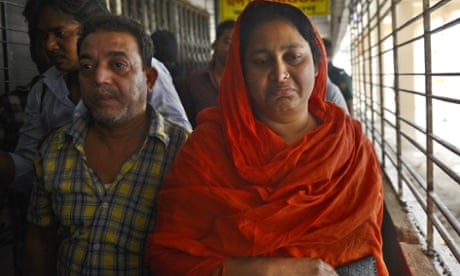 Police in Bangladesh
have charged five suspected Islamic extremists with the murder of an
atheist blogger, one of four secular writers hacked to death in the
south Asian state this year.
Police in Bangladesh
have charged five suspected Islamic extremists with the murder of an
atheist blogger, one of four secular writers hacked to death in the
south Asian state this year.Washiqur Rahman, 27, who wrote under a pen name on Facebook and repeatedly criticised religious conservatives, was killed near his home in the capital, Dhaka, in March.
Police brought the charges – the first in any of the four murders this year – in a Dhaka magistrates court on Tuesday, which will now decide whether to open a trial or order further investigations.
Authorities in Bangladesh have been under international pressure to demonstrate their commitment to protect free speech in the poor but fast developing Muslim-majority country.
Police have been criticised for the slow pace of investigations into the killings.
Muntashirul Islam, a Dhaka police spokesman, told Agence France-Presse: “We’ve submitted a charge sheet against five people for the murder of blogger Washiqur Rahman. The five were charged with murder.
“They include an organiser of the Ansarullah Bangla Team (ABT) and four others who are its supporters,” he said, referring to a banned local militant Islamist group, which police have blamed in all four murders.
The group has been linked to al-Qaida in South Asia, a local affiliate launched by the extremist organisation about a year ago.
Two of the suspects in the killing of Rahman are students at a religious seminary. They were tackled at the scene of the attack by local transgender people – known as hijras in the subcontinent– as they tried to flee and held until police arrested the suspects.
Rahman’s death came just weeks after a Bangladesh-born American atheist blogger was murdered in Dhaka by machete-wielding attackers.
Saiful Islam, the additional deputy police commissioner, said: “The organiser of ABT, Hasibur Rahman, also known as Abdullah, recruited the other four and trained them for nearly three months for the specific purpose of murdering Washiqur.
“They rented a room in Dhaka’s Jatrabari neighbourhood for this purpose and carried out reconnaissance on Rahman for two days before the murder,” he said, adding that three of the alleged killers were arrested by police, while Abdullah had absconded and the fifth was still at large.
In August, police arrested seven suspected Islamists, including a British citizen of Bangladeshi origin, for the murder of two other atheist bloggers.
The most recent victim was Niloy Chakrabarti, also known as Niladri Chattopadhyay, who was murdered with machetes after a gang broke into his flat in Dhaka.
Chakrabati had told police of threats against him and requested protection weeks before he died.
The murder in February of another Bangladeshi-born US citizen, Avijit Roy, a science writer and blog moderator, prompted outrage around the world.
More than 150 writers, including Margaret Atwood, Salman Rushdie, Yann Martel and Colm Tóibín, signed a letter condemning the series of fatal attacks and calling on the country’s government “to ensure that the tragic events … are not repeated”.
All victims had been active on social media, criticising the extremist Muslim ideologies that have gained strength in officially secular Bangladesh in recent years or arguing in favour of progressive causes.
source: The Guardian

No comments:
Post a Comment